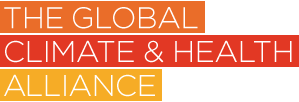
General Assembly Seventy-second session, 93rd plenary meeting UN Photo/Manuel Elias
New York – The Global Climate and Health Alliance (GCHA) called on countries’ leaders meeting at the UN Climate Summit to strengthen their climate action commitments and to act on them, because they are essential to protecting the “right to health”, a core commitment of the Paris Agreement (1).
Jeni Miller, GCHA executive director at the UN Climate Summit said: “Our planet is on fire. Sea levels are rising, coral reefs are dying, forests are burning. We are increasingly seeing the life-threatening impact of climate change on health, through air pollution, storm surges, heatwaves, risks to food security, and more. Climate action and public health are intertwined. Climate change is the defining issue of our time and now is the last window of opportunity to do something about it.”
Deaths, injuries and displacement, malnutrition, and the spread of water- food- and vector-borne diseases follow these climate impacts. Indeed, the health fallout can last months or even years after an extreme weather event or sustained, climate-driven changes.
The causes of climate change — fossil fuel-based energy and transportation, industrialized food systems, as well as land use that burns or plows or paves over the earth’s recovery systems — have health impacts themselves. Mitigating climate change offers tremendous opportunities to improve health, through cleaner air, improved diets, and more equitable communities that support healthier, more active lives.
“We are seeing progress in so many areas — clean energy and transport, more sustainable food systems. But we’re not scaling the solutions up fast enough,” added Miller. “We need policies and agreements that favor climate solutions and protect public health and global equity, over business as usual.”
Voicing health professionals’ concerns, GCHA expects governments at the UN Summit to (2):
- Signal that, in 2020, they will commit to ambitious national emissions reductions that, collectively, put us on track to limit warming to 1.5 °C, in alignment with the scientific findings of the IPCC1.5 report.
- Announce new commitments in specific action areas under the 9 tracks of the UN Climate Action Summit that demonstrate concrete plans to achieve such emissions reduction.
- Demonstrate leadership in setting an agenda for COP25, and throughout 2020, that includes the bilateral, multilateral, and global discussions designed to enable 1.5-level ambition in countries’ revised Nationally Determined Contributions [NDCs, i.e. countries’ emissions reductions commitments under the Paris Agreement] due in 2020.
- Include ministries of health and health civil society in national climate decision making to ensure climate ambition and strategies are designed to maximally protect health and improve global equity.
- Commit appropriate levels of funding to finance climate and health research, resilience, adaptation and mitigation, and to enable health sector involvement in climate decision-making and implementation.
- Establish a norm of including health in country NDCs, highlighting the health co-benefits of mitigation strategies, and ensuring protection of health in mitigation, adaptation, and resilience.
- Recognize the higher capacity, and higher responsibility of wealthier countries (with more historical responsibility for total emissions to date) to set targets that are far more ambitious — e.g. net zero emissions by 2030 or 2040.
The UN Climate Summit is a crucial step to achieve the objectives of the Paris Agreement and the Sustainable Development Goals. It will set the tone for the discussions that will be had at COP25 in Santiago, Chile in December, and for the updated Nationally Determined Contributions countries will deliver at COP26 in 2020, under the Paris Agreement.
The UN Climate Summit will reveal clearly which countries are stepping up with the kind of climate leadership this challenge requires, and which prefer denial and delay over action at this critical juncture in the history of the world.
“Millions of people in over 150 countries around the world took to the streets on Friday, demanding that world leaders heed the science and do what’s necessary to tackle climate change. We have a narrow window to act. With clear evidence of the risks posed by climate change, today’s leaders have a responsibility to take action and will be held accountable,” said Miller. -end-
Notes to editors:
- Late in 2018, health organizations across the world, representing over 5 million doctors, nurses and public health professionals, issued a Call to Action on Climate and Health, including 10 priority actions.
- “Public health faces a critical climate deadline – How the UN Climate Summit must bring urgent answers to the global health crisis”, GCHA media briefing, September 2019.
Photo courtesy of UN Photo/Manuel Elias.
For more information:
[email protected] Follow us on Twitter: @GCHAlliance
Jeni Miller, GCHA Executive Director, m. +1 510 409 2456, in New York at UN Summit
Luisa Colasimone, GCHA Communication, m. +351 910 678 050
The Global Climate and Health Alliance was formed in Durban in 2011 to tackle climate change and to protect and promote public health. The Alliance is made up of health and development organisations from around the world united by a shared vision of an equitable, sustainable future. Our vision is a world in which the health impacts of climate change are kept to a minimum, and the health co-benefits of climate change mitigation are maximised.
